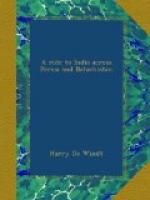[Illustration: A DIRTY NIGHT IN THE CASPIAN]
I have seldom passed a more miserable twenty-four hours. The weather got worse as the day wore on. Towards midday it commenced snowing; but this, instead of diminishing the violence of the gale, seemed only to increase it. Even the captain’s cheery, ruddy face clouded over, as he owned that he did not like the look of things. “Had I another anchor, I should not mind,” he said; calmly adding, “If this one parts, we are lost!” I thought, at the time, he might have kept this piece of information to himself. Meanwhile nothing was visible from the cabin-windows but great rollers topped with crests of foam, which looked as if, every moment, they would engulf the little vessel. But she behaved splendidly. Although green seas were coming in over the bows, flooding her decks from stem to stern, and pouring down the gangway into the saloon, the Kaspia rode through the gale like a duck. To venture on deck was impossible. One could barely sit, much less stand, and the atmosphere of the saloon may be better imagined than described. Every aperture tightly closed; every one, with the exception of the captain, Gerome, and myself, sea-sick; no food, no fire, though we certainly did not miss the former much.
About ten o’clock Z—— weighed anchor and stood out to sea. It would not be safe, he said, to trust to our slender cable another night. About midnight I struggled on deck, to get a breath of fresh air before turning in. The night was fine and clear, but the sea around black as ink, with great foaming white rollers. The decks, a foot deep in snow, were deserted save by Z—— and the steersman, whose silhouettes stood out black and distinct against the starlit sky as they paced the rickety-looking little bridge flanked by red and green lights. The Enzelli lighthouse was no longer visible. The latter is under the care of Persians, who light it, or not, as the humour takes them. This is, on dark nights, a source of considerable danger to shipping; but, though frequently remonstrated with by the Russian Government, the Shah does not trouble his head about the matter.
Three routes to Teheran were now open to us: back to Baku, thence to Tiflis, and over the mountains to Talriz,—very dubious on account of the snow; the second, from Baku to Astrabad, and thence via Mount Demavend,—still more dubious on account of bad landing as well as blocked passes; there remained to us Astara, and along the sea-beach (no road) to Enzelli, with swollen rivers and no post-horses.




